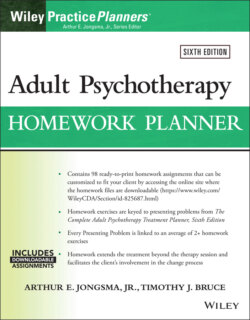Читать книгу Adult Psychotherapy Homework Planner - Arthur E. Jongsma Jr. - Страница 22
На сайте Литреса книга снята с продажи.
EXERCISE 1.B ANGER JOURNAL
ОглавлениеTo make you more aware of your angry feelings, the circumstances surrounding them, the target of them, the causes for them, and how they were shown, you are being asked to keep an anger journal. This journal will help you record the when, what, who, why, and how of the angry feelings as well as allow you to give some thought to what alternative emotional, behavioral, or cognitive reaction you might have had to the situation. Be as honest as you can be with yourself about your angry feelings, trying not to discount them, excuse them, or deny them. When you conclude that you have experienced anger, that is the time to make an entry into this journal. Your entries do not have to be lengthy; a sentence or two will suffice. You should enter enough information to permit you to discuss each incident with your therapist as you try to process and learn from your anger experiences. Do not forget to include experiences that have generated some anger within you even though you did not express it in words or behavior. The buildup of unexpressed anger can result in an inappropriate outburst at a later time. This journal may help you understand that phenomenon. It is also important for you to give some thought to the last entry; that is, what alternative positive reaction could you have given to the situation instead of burying or blurting out your feelings of anger. Often there is a more constructive response available that you are able to discover when you give the issue some calm consideration and analysis. The heat of the moment leads many of us to make mistakes. Try to make at least one entry per day into your anger journal.
The anger journal that follows asks you to enter the date and time of the experience that generated anger. Second, you are asked to enter a description of the situation, such as where you were and what was happening. Third, you are asked to name the people who were present and specifically the people with whom you were angry. Next, you are asked to enter a sentence or two indicating your reason(s) for being so angry or the cause of your anger. Then you are asked to describe how your anger was or was not revealed. In the final column, enter your thoughts about how you could have responded to the experience more constructively. (NOTE: Please make additional copies of the form for later entries.)
| Entry | What | |
|---|---|---|
| (# of entry) | (Situation) | |
| Day/Date | ||
| and Time: | ||
| __________ | Who | |
| __________ | (People) | |
| Why | ||
| (Case) | ||
| How | ||
| (Reaction) | ||
| Alternative | ||
| Positive | ||
| Reaction |
| Entry | What | |
|---|---|---|
| (# of entry) | (Situation) | |
| Day/Date | ||
| and Time: | ||
| __________ | Who | |
| __________ | (People) | |
| Why | ||
| (Case) | ||
| How | ||
| (Reaction) | ||
| Alternative | ||
| Positive | ||
| Reaction |
